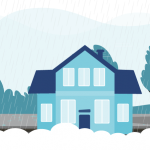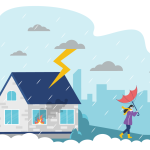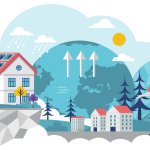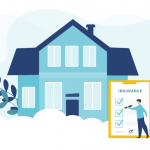8 Tips to Protect Your Property From Wildfires
July 4, 2023
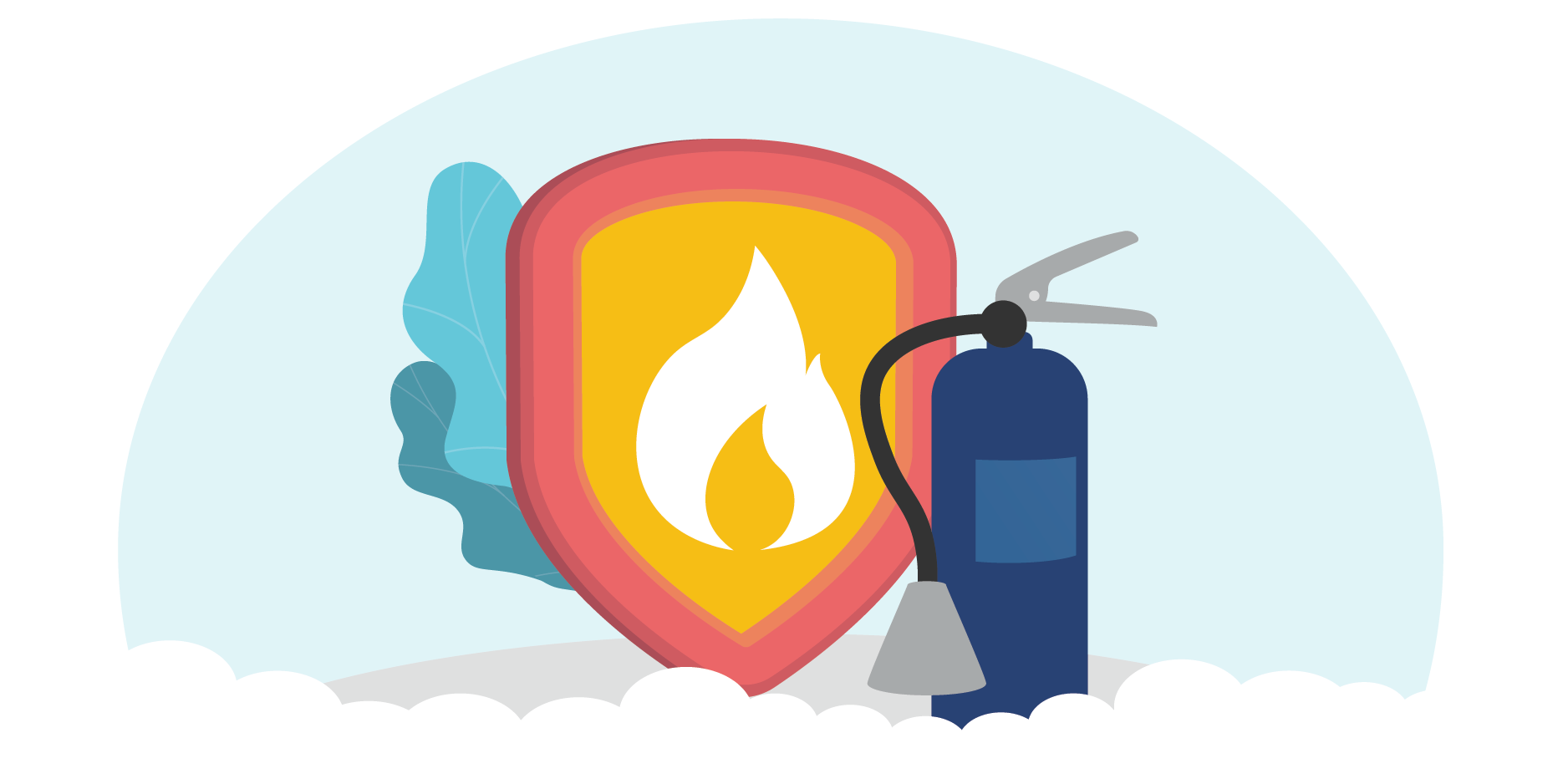
Due to rising global temperatures caused by climate change, the frequency and severity of natural disasters like wildfires has been increasing. Canada is currently in the midst of a record-breaking wildfire season, with 1 in 4 Canadians saying that they have been affected by wildfires this year, according to a recent poll.
Not only are these wildfires detrimental to the surrounding forests, homes, infrastructure, and air quality—they also come with implications for your Home Insurance. Some insurance companies are now re-evaluating fire risk levels, which could lead to premium increases or limited coverage options, especially for those living in wildfire-prone areas.

In the face of unprecedented wildfires, here are some tips to help you minimize risk and protect your property.
1. Know the fire risk level of your area.
The 2023 spring wildfire season has been the worst Canada has ever seen, with more than 5 million hectares of land burned—that’s more than the entire 2016, 2019, 2020 and 2022 seasons combined, and we’re only partway through the season. Nearly 9% of the world’s forests are located in Canada, and it’s never been more important to prioritize fire prevention on your property, especially in higher-risk areas.
Generally speaking, if your home is surrounded by forest or grassland, then you’re at a higher risk of fire danger during the May-September wildfire season. For the most up-to-date details on your area, refer to the Canadian Wildland Fire Information System Interactive Map.
RELATED: 6 Tips for Protecting Your Seasonal Property
2. Test your smoke alarms and carbon monoxide detectors.
A functioning smoke alarm will let you know the moment a potential fire breaks out, giving you enough time to put it out before it spreads further, or to exit your home safely. Carbon monoxide, which can come from faulty home appliances, could allow a fire to spread extremely quickly, or even act as a deadly poison in large amounts. But since it’s an odourless and invisible gas, you’ll need a carbon monoxide detector to notify you if it’s in the air.
Ideally, you should have both smoke and carbon monoxide alarms (or one device that combines both functions) on every floor of your home. Check the batteries and expiration dates on your smoke alarms and carbon monoxide detectors to make sure they’re in good working order, and regularly clean them to prevent dust from building up and reducing functionality. We recommend testing your alarms at least twice a year—it’ll only take a few moments, and could potentially save lives.
RELATED: 5 Advantages of Using an Independent Insurance Broker
3. When it comes to fire safety, the closer, the better.
If you want to go the extra mile to make sure you’re protected in case of fire, install fire extinguishers within reach on every floor of your home. Regularly inspect them for signs of corrosion or damage, make sure that they’re refilled after every use, and keep an eye out for the expiration date (usually between 10 and 12 years).
Your distance to the nearest fire hydrant or fire station won’t just affect how quickly emergency fire services can reach your property—it’ll also affect your insurance premium. The closer you are, the less damage you’re likely to sustain in the event of a fire. Homes that are fortunate enough to have fire hydrants within 300 metres will see the lowest premiums, while homes that are over 13 kilometres away from a fire station are considered unprotected and should expect the highest premiums.
RELATED: 6 Common Home Insurance Claims—and How to Avoid Them
4. It’s all in the building materials.
The heat from a wildfire has the potential to easily break single-pane windows, so consider installing tempered, multi-pane windows to boost the fire resistance of your home. Your interior and exterior doors should also be fire-rated and have a proper seal to keep any fire and smoke contained.
Whether you’re building your own home from the ground up or conducting renovations, look into using fire-resistant materials, such as asphalt or metal roofing and fibre-cement siding instead of vinyl or wood. For decks or fences, consider using non-flammable materials like concrete or metal. And with today’s advanced construction materials, you don’t always have to sacrifice your aesthetic vision either. For example, steel can be designed to look like wood grain, while maintaining the benefits of being made of metal. However, if you’d still prefer to use wood or if you have existing wooden structures, be sure to apply an approved fire-proof coating.
RELATED: 5 Things You Should Know Before Renovating Your Home
5. Be mindful of your yard.
Under dry conditions, soil and mulch can become a serious fire hazard. To prevent a fire from starting or spreading, avoid keeping mulch in large clumps and be sure to water your plants regularly, or use an automatic watering system to maintain a consistent moisture level. Store unused soil and mulch away from heat sources or combustible materials like wood, fuel, or cleaning products—and don’t save any soil from this year to use for next year, since it can quickly dry out and become flammable. Consider using fire-resistant clay pots instead of plastic pots for any potted plants you may have.
Letting dry yard debris collect around your home can also become a fire hazard, especially if you have vinyl or wood siding. Make sure to clear out a radius around the perimeter of your home and remove anything that could potentially ignite from a wildfire. Prune any trees and shrubs around your home and surrounding power lines, and keep your grass healthy and neatly trimmed; long, dried-out grass can become an easy entry point for wildfires.
RELATED: 10 Things Your Home Insurance Doesn’t Cover
6. Keep up with home maintenance.
House fires often start or spread due to circumstances that could have been prevented with some prior upkeep. Here are some simple ways you can be proactive with your home maintenance to prevent fires:
- Regularly clean out your gutters to avoid the buildup of leaves and other debris.
- Clean off extra grease from your stove or oven.
- Regularly inspect power cords for signs of deterioration and have them replaced accordingly.
- Remove lint from the filter in your dryer before or after each use.
- Use a fireplace screen to protect your floor and rugs from being hit by sparks.
- Regularly clean out chimney flues, especially when burning oil, coal or wood.
- Reduce clutter around your home (clothes, boxes, books, etc.) that could potentially fuel a fire and/or obstruct firefighters from gaining access to extinguish flames.
RELATED: 12 Spring Home Maintenance Tips
7. Have an evacuation plan.
It pays to be prepared for a wildfire ahead of time, especially if you live in a high-risk area. Make sure that everyone in your household knows what to do if a fire does occur, and don’t forget to include pets in your evacuation plan. Identify two ways to exit every room (in case one path gets obstructed) and determine a pre-arranged meeting spot outside.
Practice your evacuation plan ahead of wildfire season each year to ensure that all members of your household are on the same page. Consider packing a grab-and-go bag containing essentials and keeping it in an easily reachable area. Always remember: NEVER go back into a building that’s on fire. Fires spread fast, so get out as quickly as possible, keep your distance, and call the fire department immediately.
RELATED: 4 Signs Your Home May Be Underinsured
8. Make sure you’re covered—just in case.
As a homeowner, you want to do all you can to protect your property, especially when the effects of climate change show no signs of slowing down. But even if you’ve taken all the precautions to fireproof your property, you can never quite predict what nature has in store.
The loss of a home to a fire is emotionally and financially devastating—not only would you be looking at the cost to rebuild your home, but also the additional living costs incurred while your home is under construction, which could take over a year in the most severe cases. That’s why it’s so important to get the coverage you need in place ahead of time, so that you can be secure in the knowledge that you’re protected in case disaster strikes.
Need expert advice? PROLINK can help you find a comprehensive Home Insurance solution to give you the peace of mind you deserve. With over 40 years of experience and a wide network of over 30 insurers, our dedicated team of advisors will survey the market and guide you to the right coverage, from the right insurer, at the right price.
Connect with PROLINK today to learn more!
PROLINK’s blog posts are general in nature. They do not take into account your personal objectives or financial situation and are not a substitute for professional advice. The specific terms of your policy will always apply. We bear no responsibility for the accuracy, legality, or timeliness of any external content.
